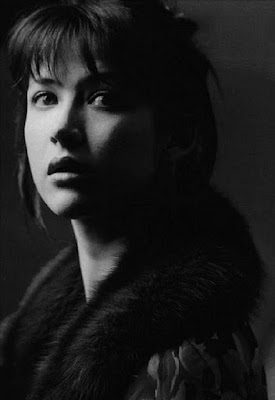S o p h i e M a r c e a u

Sophie Marceau
Artist Unknown
- b. Sophie Dani鑜e Sylvie Maupu
- Sophie
Marceau, though popular, has never really fulfilled her early promise.
Binoche now has the Oscar, Bardot the iconic status, and Deneuve the
eternal chicness, but Marceau has been left behind, surpassed by a new
generation of French stars. Nevertheless, she is up there with the big
stars of French cinema but it is unlikely she will reach
the summit
-
Sophie Marceau (n閑 Sophie Maupu) was born November 17, 1966, in Paris, France.
While growing up with her father -- who was a truck driver -- in the Parisian suburbs,
Sophie was always far removed from the big movie studios of France.
When she was 14, a friend of her's informed her that French director Claude Pinoteau
was casting fresh talent for his film, La Boum. Sophie was cast in the teenage film,
released in 1980. The film was a huge hit and led to the sequel, La Boum 2, released
2 years later.
Sophie was honored with the Cesar (French Oscar) for Most Promising Actress, in 1983. Legally tied to her contract with Gaumont, the movie studio she had worked with, Sophie paid one million French francs to buy back her contract when she was 16 years old -- of course, she had to borrow the money to pay the large sum, but it was worth it for a newly independent Sophie.
Sophie then broke away from the mold of a teenage star and moved onto more dramatic parts, in films such as 1984's Fort Saganne, and Joyeuse P鈗ues (Happy Easter); 1985's L'Amour Braque (directed by her long-time boyfriend, Andrzej Zulawski) and Police; 1986's Descente aux Enfers (Descent Into Hell); 1988's L'Etudiante (The Student) and Chouans!; and 1989's Mes Nuits Sont Plus Belles Que Vos Jours (My Nights Are More Beautiful Than Your Days), also directed by Andrzej Zulawski.
Thanks to her role in Chouans!, she was named Best Romantic Actress at the 1988 International Festival of Romantic Movies.
After a role in Pacific Palisades in 1990 and La Note Bleue, her third film by her companion, Sophie opted for lighter, fluffier roles, such as the comedy Fanfan in 1993 and La Fille de D'Artagnan a year later. She even ventured into theater with her role in Eurydice in 1991, which garnered her a Moliere Award for Most Promising Newcomer.
She took to the stage again in 1994, as Eliza Dolittle in Pygmalion.
But it was her role as Princess Isabelle in the Oscar-winning epic, Braveheart, that made international audiences take notice of the French beauty. Mel Gibson immediately knew that Sophie was the one for the part, and moviegoers agreed that she added beauty to what was already an excellent, yet gory script.
The same year that Braveheart madness was in the air, Sophie went behind the camera for a 9-minute film, L'Aube a L'envers, which opened for a film at the Cannes Film Festival.
While Sophie tries to stay away from the Hollywood scene and not get caught up in the circuit, she has an impressive resume of American films such as her co-starring role in the David Spade comedy, Lost & Found and Shakespeare's A Midsummer Night's Dream, along with Michelle Pfeiffer and Calista Flockhart.
In 1999, she jumped to Bond Girl status as Elektra King, starring opposite Pierce Brosnan in the 19th Bond outing, The World Is Not Enough.
Since her Bond fame, Sophie has starred in the French films La Fid閘it�, again under the direction of Zulawski and Belph間or -- Le Fant鬽e Du Louvre.
An animal lover, Sophie avidly and publicly protests sports such as dove-shooting and bullfighting, and supports Arc-en-Ciel, an organization that helps sick children.
While family and friends refer to Sophie as Flatfoosie, she's known as mom to her son Vincent (with husband Andrzej Zulawski), born July 1995.

Comments
Post a Comment